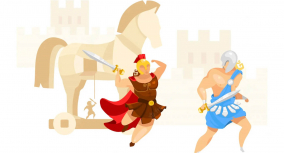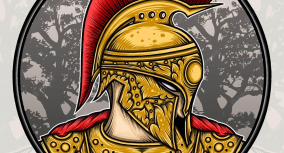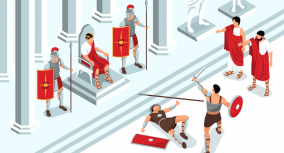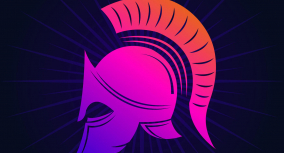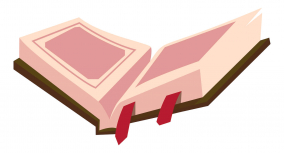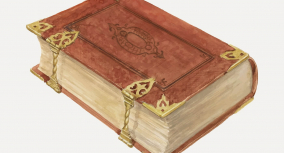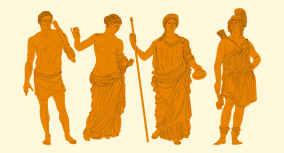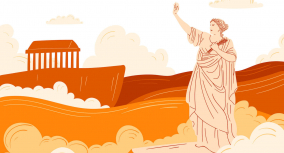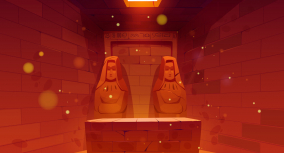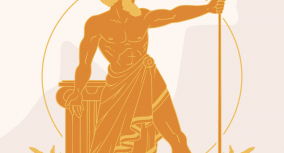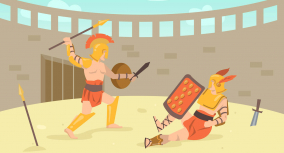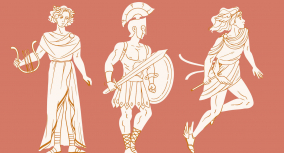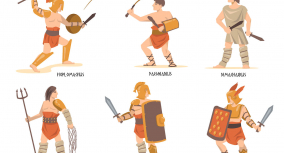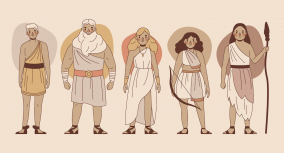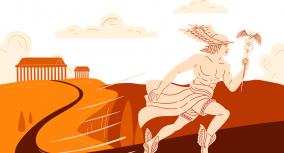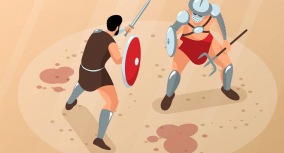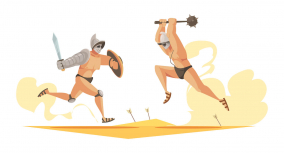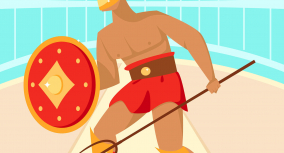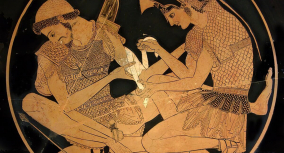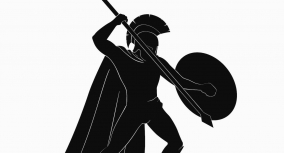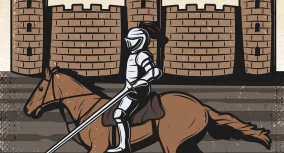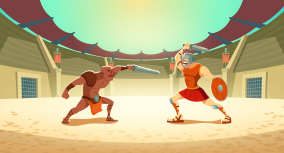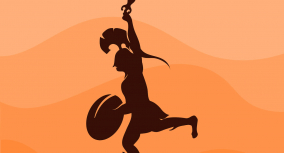What are the themes in The Iliad? Find here the answer to this question. This article by our experts analyzes rage, glory, honor in The Iliad, as well as other epic poem’s themes.
Ancient people perceived the world differently than we do now. These cultural features are revealed in the characters’ choices in stressful situations, their motivation, and their dreams. This section provides a summary of the main Greek values in The Iliad and themes that are unfamiliar to the modern reader.
🗝️ The Key Iliad Themes
The key themes in The Iliad are: rage, honor, and glory.
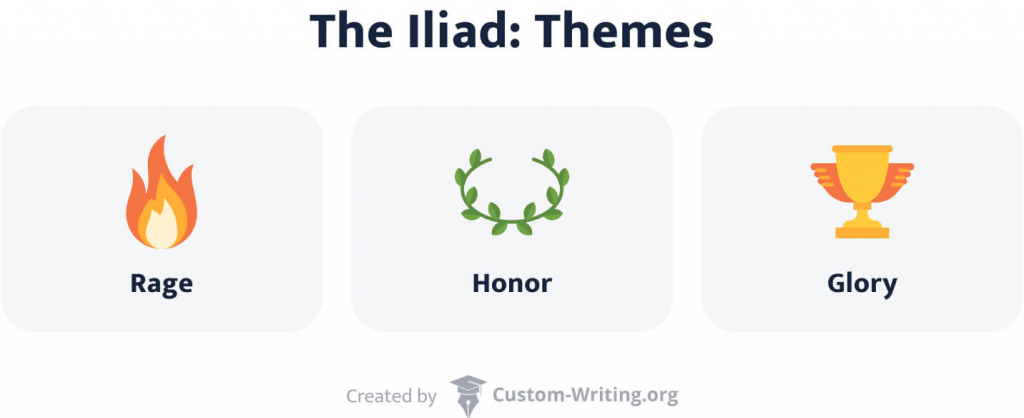
🏆 Kleos (Glory) in The Iliad
Kleos in The Iliad is the central purpose of all soldiers and their greatest motivation. They can achieve it by doing prominent deeds. Although the benefits of glory are dubious for a contemporary person, the memory that will outlive the heroes was the best thing they could do in a lifetime. Homer never mentioned any idea of an afterlife, except for Hades and his gloomy underworld. Only the great deeds can secure eternal life after the person is gone: they will live in the memory of others.
The most decent occupation for a Homeric hero is to think about war and glory. Even the characters that can no longer fight participate in the battle as counselors or diplomats. Warriors are often put in circumstances forcing them to make a difficult choice between their families and fame. As expected, most heroic characters choose the latter. Achilles could go home and leave peacefully till advanced years, but he preferred to stay in Troy to win glory and die young.
We would consider Hector to be a more likable character. He loves his family and does his best to protect the city from destruction. We speak about Achilles as an opinionated and selfish person. But from the Ancient Greek perspective, Achilles was more of a hero than Hector.
The Iliad Quotes on Glory
Then Pallas Minerva put valour into the heart of Diomed, son of Tydeus, that he might excel all the other Argives, and cover himself with glory.
The Iliad, Narrator, Book V
Father Jove that rulest from Ida, most glorious in power, vouchsafe victory to Ajax, and let him win great glory: but if you wish well to Hector also and would protect him, grant to each of them equal fame and prowess.
The Iliad, the Achaeans, Book VII
Though you hate both (Agamemnon) and his gifts with all your heart, yet pity the rest of the Achaeans who are being harassed in all their host; they will honour you as a god, and you will earn great glory at their hands.
The Iliad, Odysseus, Book IX
Wretch, you shall now surely die. You have stayed me from fighting further with the Trojans, but you shall now fall by my spear, yielding glory to myself, and your soul to Hades of the noble steeds.
The Iliad, Odysseus, Book XI
Argives, shall we let Hector son of Priam have the triumph of taking our ships and covering himself with glory?
The Iliad, Neptune, Book XIV
🌻 Timē (Honor) in The Iliad
We often use the words “honor,” “pride,” and “reputation” as synonyms, but for a Homeric character, honor meant much more than pride. It showed how much your peers respect you. It also defined your value in the eyes of society. A lost honor meant that you became unimportant to the given community. The only way out was to restore your value by proving that you were useful and worthy of respect.
Honor and glory make up the essence of the code of a hero and are the essential themes in The Iliad. But while warriors could become glorious in battle, they could also earn honor through other activities. Prominent speechmaking, noble qualities, and loyalty were critical. In the poem, all the honorable heroes show all these three factors of reputation.
In the Christian tradition, pride is a negative trait. Jesus Christ goes through pain and humiliation without objecting. Pride is linked to egoism in modern culture. But it is impossible to imagine a humble Greek hero or god.
Achilles chooses glory over humble and dull life. He is a king at home. It means that he already has respect and honor, but it is not enough. Glory is the only thing that can ensure everlasting praise from as many people as possible. It is his purpose in life.
The Iliad Quotes on Honor
Father Jove… hear my prayer, and do honour to my son, whose life is to be cut short so early. King Agamemnon has dishonoured him by taking his prize and keeping her. Honour him then yourself, Olympian lord of counsel, and grant victory to the Trojans.
The Iliad, Thetis, Book I
My friends, quit yourselves like brave men, and shun dishonour in one another’s eyes amid the stress of battle. They that shun dishonour more often live than get killed, but they that fly save neither life nor name.
The Iliad, Agamemnon, Book V
When they had done all this and had prepared the feast, they ate it, and every man had his full and equal share, so that all were satisfied, and King Agamemnon gave Ajax some slices cut lengthways down the loin, as a mark of special honour.
The Iliad, Narrator, Book VII
I urged you not to do so, but you yielded to your own pride, and dishonoured a hero whom heaven itself had honoured—for you still hold the prize that had been awarded to him.
The Iliad, Nestor, Book IX
If any of you is struck by spear or sword and loses his life, let him die; he dies with honour who dies fighting for his country; and he will leave his wife and children safe behind him.
The Iliad, Hector, Book XV
🔥 Menis (Rage) in The Iliad
The Anger theme is tightly knit with honor in The Iliad of Homer. The plot turns upon the “wrath of Achilles” after he feels dishonored by Agamemnon. In the beginning of the poem, Apollo forced Agamemnon to return Chryseis (a woman he captured in combat) to her father because otherwise, all the Greeks would die of a plague. The commander took Briseis, Achilles’s favorite war prize, to replace his own. Achilles accepts the action but gets deeply insulted. His honor is wounded.
For Ancient Greece, anger was about honor in most cases. When a person is entitled to respectful treatment but other people show less respect, it was deemed to be an insult.
The term “wrath” is often mentioned in the epic poem in reference to Achilles, Apollo, and Zeus. The Trojans are enraged by the Achaeans who came to them with war. The Achaeans are angry with the citizens for holding Helen. Hera is angry with Trojans in general and hates them. In particular, she is mad with Paris, who chose Aphrodite as the most beautiful among the immortals.
The Iliad starts with rage: “Sing, O goddess, the anger of Achilles.” Why was the negative emotion given so much attention? For Ancient Greeks, an enraged hero was the sword of the gods. Anger was a powerful motivator that bolstered the warriors’ morale.
The Iliad Quotes on Rage
Thus did he pray, and Apollo heard his prayer. He came down furious from the summits of Olympus, with his bow and his quiver upon his shoulder, and the arrows rattled on his back with the rage that trembled within him.
The Iliad, Narrator, Book I
Jove, moreover, has sent his lightnings on their right; Hector, in all his glory, rages like a maniac; confident that Jove is with him he fears neither god nor man, but is gone raving mad, and prays for the approach of day.
The Iliad, Odysseus, Book IX
Fools that we are to be thus madly angry with Jove; we keep on wanting to go up to him and stay him by force or by persuasion, but he sits aloof and cares for nobody, for he knows that he is much stronger than any other of the immortals.
The Iliad, Juno, Book XV
As a fire raging in some mountain glen after long drought… even so furiously did Achilles rage, wielding his spear as though he were a god, and giving chase to those whom he would slay, till the dark earth ran with blood.
The Iliad, Narrator, Book XX
Achilles mad with rage darted towards him, with his wondrous shield before his breast, and his gleaming helmet, made with four layers of metal, nodding fiercely forward.
The Iliad, Narrator, Book XXII
👭 Women in The Iliad
On the surface, the poem tells us the story about men. However, the women’s role in The Iliad is far from secondary.
First, the beginning of Book 1 mentions some “goddess” who should sing the anger of Achilles. Homer could refer to Calliope here, the divine muse of epic poetry.
Second, the entire conflict is built around women. Paris chose Aphrodite as the most beautiful deity cause she promised him Helen as a wife. His decision offended Hera, who started to hate all the Trojans and their city in the person of Paris.
Helen was stolen from her husband, Menelaus. The king of Sparta took other Achaeans and sailed to Troy on more than 1,200 ships to bring Helen back and restore the Greek honor. Helen felt her guilt in the death of many soldiers on both parts, but there was little she could do to change the state of things.
Hecuba, the queen of Troy, symbolizes a mother whose sons are killed in battle. Her figure highlights how brutal war can be for a lonely widow, even if she is a queen. Her city is doomed, and mourning is the only thing that remains for her. Andromache also represents a loving wife who lost her heroic husband, Hector.
The female deities in The Iliad are as important as their male peers. Hera, Athena, Thetis, and Aphrodite often decide the outcome of each battle.
The Iliad Quotes on Women & Gender Roles
I will not free her. She shall grow old in my house at Argos far from her own home, busying herself with her loom and visiting my couch; so go, and do not provoke me or it shall be the worse for you.
The Iliad, Agamemnon, Book I
Will you leave Priam and the Trojans the glory of still keeping Helen, for whose sake so many of the Achaeans have died at Troy, far from their homes?
The Iliad, Minerva, Book II
Small wonder that Trojans and Achaeans should endure so much and so long, for the sake of a woman so marvellously and divinely lovely.
The Iliad, Trojans, Book III
Nevertheless he did distribute some meeds of honour among the chieftains and kings, and these have them still; from me alone of the Achaeans did he take the woman in whom I delighted—let him keep her and sleep with her.
The Iliad, Achilles, Book IX
I call Jove the first and mightiest of all gods to witness, I call also Earth and Sun and the Erinyes who dwell below and take vengeance on him who shall swear falsely, that I have laid no hand upon the girl Briseis, neither to take her to my bed nor otherwise, but that she has remained in my tents inviolate.
The Iliad, Agamemnon, Book XIX
Thank you for reading this article! You might also want to take a look at The Iliad essay topics collection. And if you need to make the text of your essay more colorful, try our paraphrasing tool. Any questions left? Check the QA section!
🔗 References
- Themes in The Iliad – Video & Lesson Transcript | Study.com
- The Homeric Iliad and the glory of the unseasonal hero
- Heroes and the Homeric Iliad
- Gender Roles in Homeric Epic – Medium
- Quotes About Glory in The Iliad – Video & Lesson Transcript
- Greek Heroic Motifs in “The Iliad”: Agamemnon and Priam
- Glory of War in the Homer’s “Iliad”
- Decision Making in The Iliad
- The Iliad’s Helen and The Odyssey’s Penelope – Compare and Contrast
- Andromache in the Iliad: Character Analysis
- Heroic Code in Homer’s Iliad
- The Warrior Culture in “The Iliad” by Homer
